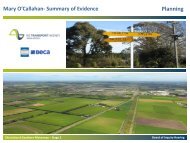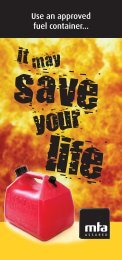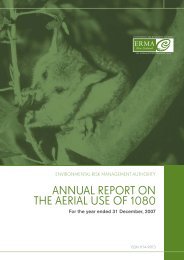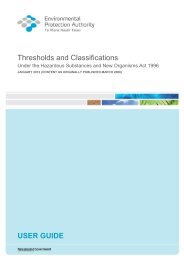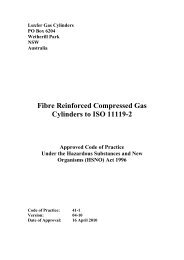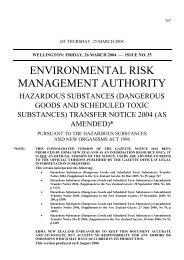LPG for suppliers information sheet
LPG for suppliers information sheet
LPG for suppliers information sheet
Create successful ePaper yourself
Turn your PDF publications into a flip-book with our unique Google optimized e-Paper software.
<strong>LPG</strong> <strong>for</strong> <strong>suppliers</strong>September 2011<strong>LPG</strong> <strong>suppliers</strong> must make sure customers know therisks posed by <strong>LPG</strong>, how to handle it safely, where toseek advice and what to do in an emergency.You must give your customer a safety data <strong>sheet</strong> thatcomplies with the hazardous substances legislation.If you deliver <strong>LPG</strong> in cylinders or supply in bulk you mustensure that each customer:is in<strong>for</strong>med of the risks posed by <strong>LPG</strong>; andhas a location test certificate issued by a test certifierif they hold more than 100 kg of <strong>LPG</strong>.Service stations, cylinder filling facilities and cylinderexchange facilities do not deliver directly to a customer’spremises. There<strong>for</strong>e, they are not obliged to check if thecustomer’s premise has a location test certificate.Delivering cylindersThe person delivering and connecting cylinders must betrained and should be an approved handler. If the person isnot an approved handler they must be able to contact anapproved handler at any time if necessary.An approved handler is a person who knows about<strong>LPG</strong> and how to handle it safely. They know about theequipment being used and the requirements of thehazardous substances legislation.Drivers delivering <strong>LPG</strong> must also have a “D” (dangerousgoods) endorsement on their drivers licence.The <strong>LPG</strong> Association offers an approved fillertraining scheme, go to www.lpga.co.nz<strong>for</strong> more in<strong>for</strong>mation.Refilling cylindersAnyone filling an <strong>LPG</strong> cylinder must have an approvedfiller test certificate, unless they are filling the fuel tankfixed to a vehicle.Supporting customersApproved handlerFor sites with more than 100 kg of <strong>LPG</strong> that do not havean approved handler, the <strong>LPG</strong> must be secure. For fixedinstallations this means the supplier disconnects orreconnects all <strong>LPG</strong> cylinders.For sites with fixed installations with more than 100 kgof <strong>LPG</strong> and where the customer needs to connect thecylinders themselves, an approved handler must havegiven them guidance and must be available to give furtheradvice if needed.If your customer is swapping cylinders regularly, the idealsolution is <strong>for</strong> them or one of their employees to be anapproved handler.InspectionsIf the customer has between 100 kg and 300 kg of <strong>LPG</strong> theymust have a Location Test Certificate issue by a test certifierbe<strong>for</strong>e you can supply <strong>LPG</strong>.If they have a test certificate, you may, at your discretionand if the customer asks, undertake ongoing inspectionsof their facility, consistent with the Code of Practice <strong>for</strong> <strong>LPG</strong>Cylinder Storage Compliance 100 kg to 300 kg.Compliance with the code means you may continue tosupply <strong>LPG</strong> to the customer. If your inspection finds thatthe site has changed, you must tell the customer to contacta test certifier to confirm that the site still complies. Thetest certifier must issue a new LTC be<strong>for</strong>e you continue tosupply.Alternatively, the customer may continue to engage atest certifier and obtain a Location Test Certificate. Thetest certifier may specify a Location Test Certificate validity
<strong>LPG</strong> <strong>for</strong> <strong>suppliers</strong> EPA0052period of up to three years. If less than this your customershould ask the test certifier what needs to be done toobtain a three year certificate.In-situ fillingIf delivery changes from an exchange cylinder deliveryto in-situ cylinder filling, the customer must get a newlocation test certificate.You cannot deliver <strong>LPG</strong> until the new certificate has beenissued. The approved Code of Practice <strong>for</strong> in-situ fillingshould be followed, this is available on the EPA website.InstallationTwin-pack, multi-cylinder facilities and bulk storage tanksmust comply with the hazardous substances legislation,the requirements of the Gas Act, and the health and safetyin employment legislation.All fixed gas appliances, including the pipes and hoses,must be installed by a licensed gasfitter. Ask the gas fitter<strong>for</strong> a certificate of compliance <strong>for</strong> the installationAll cylinders over 13 kg must be securely held in place withchains and/or brackets. To prevent unauthorised access,cylinders with an aggregate quantity in excess of 100 kg of<strong>LPG</strong> should be secured in a lockable cage.Managing your siteAs a supplier, your site must comply with the hazardoussubstances legislation. This means that you must:Identify a person in charge to manage the <strong>LPG</strong> storedand used at the site;Ensure staff are trained to handle <strong>LPG</strong> and use thenecessary personal protective equipment.Ensure that there is in<strong>for</strong>mation available to staff andvisitors, such as product labels, safety data <strong>sheet</strong>s andsigns.Have emergency procedures and equipment in place todeal with any emergency, including fire extinguishersand an emergency evacuation plan.Have a current location test certificate, most certificateswill be valid <strong>for</strong> one year but ask your test certifierabout an extension <strong>for</strong> up to three years.Refuelling motor vehiclesSelf-serve customers at a refuelling outlet mayfill their own vehicles. However, the suppliermust ensure that:September 2011 2Have approved handler test certificates <strong>for</strong> employeeshandling <strong>LPG</strong> (these are valid <strong>for</strong> five years).Have approved filler test certificates <strong>for</strong> employeesfilling <strong>LPG</strong> cylinders, valid <strong>for</strong> one year if you follow the<strong>LPG</strong> Association Approved Filler Scheme.If you are unsure about what you need, contact a testcertifier <strong>for</strong> advice.Road Tank WagonsA test certifier needs to approve the design of any roadtank wagon and to complete pre-commissioning checksand in-service checks.Drivers must have a “D” endorsement on their license andhold approved handler and approved filler test certificates.The dispenser and nozzle meet the requireddesign criteria.The system has an emergency shutdownsystem.There are clear filling instructions.An approved handler is available.You can find a test certifier in your area bysearching www.epa.govt.nz.Important contactsWrite the details of your test certifier hereAdditional leaflets <strong>for</strong> domestic andindustrial users of <strong>LPG</strong> are available atwww.epa.govt.nzEnergy safety 0508 377 463EPA Helpline 0800 376 234


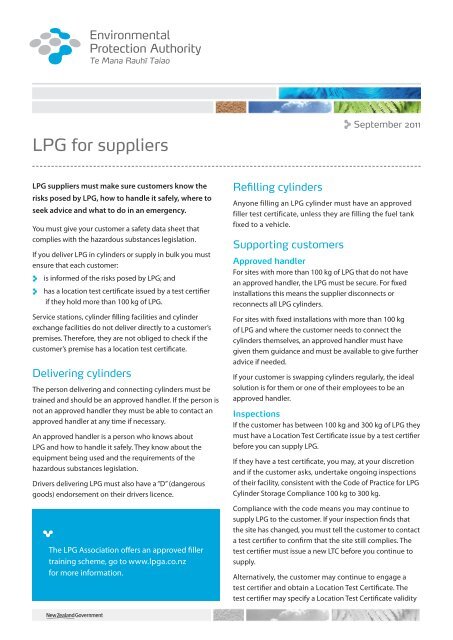
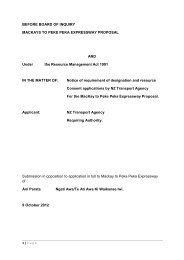
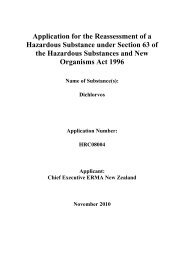
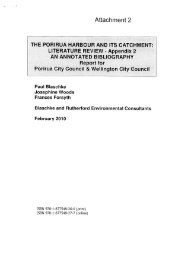
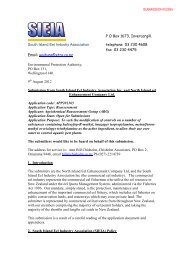

![Application for test certificate [pdf, 131kb]](https://img.yumpu.com/50666502/1/184x260/application-for-test-certificate-pdf-131kb.jpg?quality=85)
